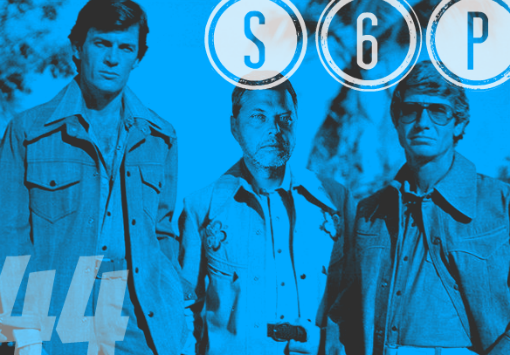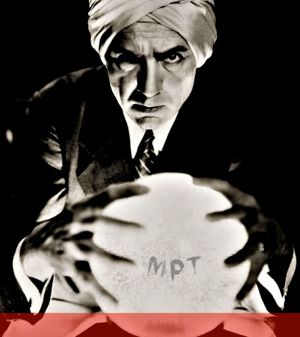When I first started talking with ethnomusicologist Bruce Conforth about the possibility of his being on the show, I wasn’t exactly sure what we’d be talking about. He didn’t seem terribly enthusiastic about the prospect of discussing his time at the Rock and Roll Hall of Fame and Museum, where he was the founding curator, and, while I very much enjoy early American blues, I didn’t feel as though I knew enough to really engage him in a conversation on the subject that he’d find stimulating. Thankfully, though, we decided to give it a shot, and what resulted is probably one of my favorite Saturday Six Pack discussions to date… And he did eventually open up about the living hell that was Rock and Roll Hall of Fame, but we’ll get to that later.
We began with a discussion about Lawrence Gellert, the subject of Conforth’s most recent book, African American Folksong and American Cultural Politics: The Lawrence Gellert Story. Gellert, who Conforth would come to know about through his research in the archives of Indiana University as a PhD student 30-some years ago, was a pioneering figure in the field of ethnomusicology, traveling through the American south with his audio equipment, collecting field recordings of African-American musicians, a full decade before John Lomax did essentially the same thing to much greater acclaim. Conforth would eventually meet several people who had known Gellert, who “disappeared” in 1979, at the age of 80, and, through them, came to be in the possession of several of his previously unreleased recordings. Conforth would go on to release many of these recordings in two volumes; “Cap’n You’re So Mean” [Rounder Records 1982] and “Nobody Knows My Name” [Heritage Records 1984].
Conforth and I talked at length about Gellert, the far left politics of his immigrant family in New York, and the evidence that would seem to indicate that he himself wrote a half dozen or so of the more politically charged songs he claimed to have discovered black musicians singing in the American south. Conforth believes that Gellert was so anxious to prove to the New York left that he’d discovered the true voice of the American proletariat on his travels, that he didn’t want to leave anything to chance. So he wrote a handful of timely protest songs, and found black musicians to perform them. Conforth not only has Gellert’s notebooks, where it’s clear that he’s working on the songs in question, but he also has audio of Gellert teaching people how to play and sing at least one of these songs that he’d written. This, Conforth tells us, wasn’t all too uncommon. John and Alan Lomax, he says, were known to send Lead Belly into southern towns to teach people how to play certain songs, when they couldn’t find musicians performing the kinds of music that they wanted for their field recordings.
Despite the fact that Gellert wrote some of the material which he passed off as the authentic work of black musicians, Conforth makes it clear that he finds Gellert’s work superior to work of the John and Alan Lomax. When asked why people know of the Lomaxes, and not Gellert, Conforth attributes much of it to the politics of the day, and the fact that Gellert was caught up in the red scare of the 1950s.
And we talked about the sad end of the eccentric Gellert, who appears to have been whisked away from his Greenwich Village home in 1979 by his family when he was named a “person of interest” in the high profile Etan Patz kidnapping case. According to Conforth, Gellert’s landlord likely offered him as a potential suspect in hopes of driving the elderly man from his rent controlled apartment. Gallert, however, who suffered from mental health issues his entire life, chose not to stay and cooperate in the investigation, but instead flee the city.
And, after that, we discussed Conforth’s life as a young man in New Jersey in the late 1950s, and how he came to discover Izzy’s Young’s Folklore Center at 110 MacDougal Street in New York City’s Greenwich Village, right next door to the Gaslight Cafe, where Conforth would see the likes of Son House and Mississippi John Hurt perform, thus beginning his evolution away from folk and toward the blues. [He describes Mississippi John Hurt as being a mix of Yoda and ET.] We talked about the early New York folk scene, his memories of a young Bobby Zimmerman writing songs on Young’s typewriter at the back of the Folklore Center, and his friendship with Dave Van Ronk, who would later be immortalized in the Cohen brothers’ film Inside Llewyn Davis. [The film did not ring true, Conforth noted, saying that Van Ronk’s book, The Mayor of MacDougal Street, was much better.]
After saying that he decided against publishing a tell-all book about the launch of the Rock and Roll Hall of Fame, for fear that it would define him the rest of his life, I wasn’t sure that Conforth would want to say too much about the time that he’d spent traveling between the record industry execs in New York and the Cleveland business owners who funded the construction of the museum, but, once the subject was broached, Conforth didn’t hold back. We talked about the origins of the Hall of Fame, and about the bad blood between the record industry executives in New York and the business people in Cleveland who put up the money. The New York board didn’t want to put the museum in Cleveland, Confourth said. It’s just that Cleveland was the only city that came up with the financing package to make it happen. The record industry people hated that it was there, and that, according to Conforth, is why only two induction ceremonies have ever been held there, which pisses off the Cleveland board to no end. And it was Conforth’s job to travel between these two dysfunctional boards, and try to make something happen. While he refrained from naming names for the most part, he did mention his first meeting with Rolling Stone publisher Jann Wenner, just a week after getting the job as curator. Wenner, says Conforth, was behind a giant desk in the corner of an enormous office. As he walked the 30 yards toward him, according to Conforth, Wenner put his bare feet up on the desk and said, “Now do you know where the power lays.” And, it would seem, this was just the tip of the iceberg. The whole enterprise, as Conforth tells it, was “unbelievably corrupt” and driven by the heads of record labels who either wanted their people in, or to keep others out. Speaking of which, Conforth told us that a very senior record label guy once told him, “the Moody Blues will never get in.” It didn’t matter that they defined the art rock genre, they apparently crossed the wrong person, and that was it. [They’ve yet to even be nominated.]
As for why Conforth decided to open up about the experience, it may have had something to do with the fact that, just days before, Steve Miller, who had just been inducted into the Hall of Fame, said the following to the press. “This whole industry fucking sucks and this little get-together you guys have here is like a private boys’ club,” Miller said, “and it’s a bunch of jackasses and jerks and fucking gangsters and crooks who’ve fucking stolen everything from a fucking artist.” Conforth, who told us that he’d fought to get Miller inducted when he was on the Hall of Fame’s nominating committee years ago, said he was happy that he stood up and told the world how it really is.
And then we talked about the new biography of Robert Johnson that he’s working on with Gayle Dean Wardlow. [Conforth currently sits on the Executive Board of the Robert Johnson Blues Foundation, in addition to being the Director of the Blues Heritage Foundation.] Conforth promised that it will be the most exhaustive book on Johnson ever published, and we went into his research at some length. We talked about the myth surrounding Johnson, and the difficulty of disentangling fact from fiction now, almost 80 years after the iconic king of the delta blues died at the age of 27. We talked about the individual stories and how, going back to first person interviews and original documents, he was able to discern the truth. We talked about the seven months Johnson studied with Ike Zimmerman, who was one of th best guitarists in Mississippi at the time, and how the story of his having sold his soul to the devil probably got started. I ask if, by demystifying the man, it might hurt his legend. Con forth replied with a no. It’ll make him more human, he said. It’s an incredible story, he says, both heartbreaking and tragic… Oh, and if you don’t listen to anything else, you should listen to the part when Conforth reacts to the suggestion made by some that Johnson’s recorded tracks were all sped up 20%. [Let’s just say that Conforth doesn’t ascribe to the theory.]
And we ended the segment with Conforth, an accomplished musician himself, playing a few songs on his guitar, and demonstrating different regional variants of the blues. [On his sonic tour, Conforth gives examples of the east coast piedmont style, which is more piano and ragtime oriented, the more thumping Texas style, which relies on the bass of the “dead thumb”, and the Mississippi delta blues, as personified by Robert Johnson, who, Corforth tells us, was the first to incorporate the riff.]
There was a lot more… I remember, for instance, that we talked about Nickleback… But you really should just listen. It was really an incredible conversation… Here’s Conforth taking us to blues school.
[If you would like to listen to episode 44 of The Saturday Six Pack, you can either download it from iTunes or scroll the bottom of the page, where you’ll find the Soundcloud file embedded.]
Then, after a new song called “Lost Serenade” by our friend Pete Larson in Osaka, we were joined in the studio by Frank Uhle, the man behind the Festival of Found Films from the Vault, which took place the day after the episode aired at Bona Sera. Uhler and I discussed our personal experiences with found films, the treasure trove of instructional films he recently acquired from the Askwith Media Library, and why it is that he feels compelled to share things like 1951’s Improve Your Personality and the completely bewildering My Snowman’s Burning Down with strangers. [I also share a traumatic memory from my youth during this segment!]
And, after our discussion about found films, we were joined by our old friend Jim Cherewick, who I’d brought onto the show to apologize to. [The last time Jim joined us was the night that The Patti Smith Group’s Ivan Kral was on, and I didn’t let him say a single word. And, the time before that, we forced him against his will to perform the Ted Nugent song Fred Bear.] For the most part, we just drank beer and chatted, but Jim also played a few songs for us, and, at some point, ran out to his car for his portfolio, so we could flip through his drawings together. Oh, and Dylan Beckwith, of the band Soft Milk, popped in at some point and attempted to hijack the show… Here’s Jim making beautiful music.
[At some point during the show, I mention the fact that people are watching us from the rooftop across the street. Here, in case you’re interested, is photographic evidence.]
Thanks, as always, to AM 1700 for hosting the show and station owner Brian Robb for running the board, making sure the bills paid, and insuring that the toilet paper and bleach stays stocked… Oh, and extra special thanks to Cindy Hudson for introducing me to Bruce Conforth and making this episode possible.
If you like this episode, check out our archive of past shows at iTunes. And do please leave a review if you have the time, OK? It’s nice to know that people are listening, and, unless you call in, that’s pretty much the only way we know.
Now, if you haven’t already, please listen for yourself, and experience the magic firsthand.
[Episode 44 of the Saturday Six Pack was recorded live on April 16, 2016, in historic downtown Ypsilanti, Michigan, in the studies of AM1700 Radio.]















11 Comments
The Gellert story should be adapted for the screen. That’s incredible.
No way was Robert Johnson the iconic king of the delta blues. He was a flash and makes for a good legend. But, I’ve been to ground zero in Clarksdale. I saw the log cabin where Muddy Waters cut out a log to make his first guitar. He then traveled to Memphis and then Chicago. His influence on the Blues was significantly greater. I say Muddy was King! Eric Clapton, Jimmy Page, Jeff Beck and Johnny Winter also claim that Muddy had the single greatest influence on their music.
It’s not a competition. We can love them both, EOS.
As for the nickname “King of the Delta Blues”, I’m not sure where it came from. The 1961 reissue of Johnson’s recordings was called “King of the Delta Blues Singers.” I don’t know when he was originally given that title though, or by whom.
https://www.amazon.com/Delta-Blues-Singers-Robert-Johnson/dp/B00000AG6X
Can’t wait to hear this. The Hall of Fame is massively problematic.
If you claim to be King, then comparison is inevitable.
I stood in the crossroads too. Still can’t play – so I didn’t sell my soul.
I once had a conversation with a man from England who claimed we owe the British Invasion for all our Rock music. I introduced him to the Blues roots where the Brits stole all the riffs.
Gotta love the Blues! And I agree, the R & R Hall of Fame sucks. The sole source of entertainment is discussing all the great groups that didn’t make it and all the lame artists who did.
EOS is the expert on African-American art forms, and he once talked to a British guy! Plus, you’re just wrong. Howlin Wolf was the king.
I was talking about Robert Johnson once with Peter Case. When I mentioned the speed theory, he got very agitated about it. He had some interesting technical reasons for why it was total bullshit.
The Gellert stuff was strange enough, until you added in the connection to the Etan Patz case. That’s just insane.
EOS should be allowed to talk to Englishmen and have an opinion on the Blues. My obligatory credibility-fluffing anecdote on this thread will be that I once saw Albert King and B.B. King play the same outdoor concert in Kansas City. A battle of the Kings. Albert went first and B.B. got rained out. Mm hm.
Good episode!
EOS is the authority on everything.
Coming from Mississippi, I can tell everyone here that there is no one “father of the blues.” While I’m sure that white owned record labels were happy to boil the hugely diverse style of music known as “blues” into one single person or entity, one has to appreciated that this was merely a means of making money and hardly reflected anything at all about reality.
What appears on record labels (as in what has been monetized) is only the tip of a very huge musical iceberg.
One Trackback
[…] I’ll be welcoming musicologist Bruce Conforth back into the studio. As you may recall, the last time Conforth came in, we, for the most part, at his request, didn’t discuss the years he spent as the founding […]